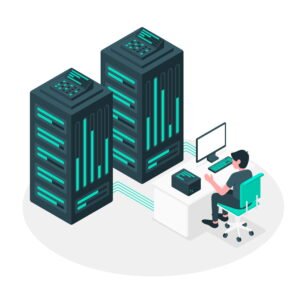Sustainable data centers have swiftly emerged as a key topic in discussions about technology and climate change.
As urban areas grow and the digital economy flourishes, the challenge of harmonizing innovation with ecological stewardship becomes increasingly pressing.
This challenge is particularly pronounced in metropolitan centers like Singapore, where data centers account for approximately 7% of the country’s electricity consumption.
The urgency for more sustainable digital alternatives has never been more pronounced. Singapore’s experience offers valuable lessons on how cities around the globe can promote development while safeguarding natural resources.
Let’s delve into how the forthcoming generation of eco-conscious data centers is being developed and its implications for our digital future.
A Pivotal Moment for Data Centers
The rapid expansion of digital services inevitably drives a significant demand for energy resources.
In 2019, acknowledging the critical situation, Singapore instituted a pause on the establishment of new data centers. This decision was not simply a reaction; it was a strategic move aimed at reducing escalating energy use and carbon emissions.
After three years of thorough analysis, the moratorium was lifted in 2022, accompanied by a new framework of rigorous regulations.
Operators are now required to achieve a design Power Usage Effectiveness (PUE) of 1.3 or below.
Additionally, they must secure Platinum certification under Singapore’s Green Mark for Data Centre standards and show a feasible pathway to utilizing 100% renewable energy.
While these initiatives represent progress, challenges persist. For example, regulatory issues surrounding the retrofitting of older “brownfield” properties still require attention.
There is also rising concern that relocating new developments to less-regulated areas like Malaysia and Indonesia merely shifts the environmental burden rather than alleviating it.
Climate Challenges Specific to Urban Data Centers
Singapore’s tropical climate introduces distinct challenges to achieving efficient operations. High humidity and elevated temperatures reduce the lifespan of equipment and complicate energy efficiency efforts compared to cooler regions.
Innovations such as liquid cooling and allowing higher ambient temperatures (between 24°C and 31°C) are proving essential.
Initially, many operators hesitated to adopt these recommendations due to concerns over equipment safety. However, with government-endorsed guidelines and emerging research backing these solutions, gradual implementation is now being observed.
Furthermore, collaboration between the public sector and industry is crucial. Initiatives like Microsoft’s Data Centre Academy and the engineering programs at the Institute of Technical Education are designed to equip a new generation of skilled professionals.
Although it may take time to see widespread effects, these investments hold the promise of cultivating a stronger, more sustainable workforce for the future.

Renewable Energy: The Missing Component of the Equation
Even with operational improvements, the genuine route to sustainable data centers relies on dependable access to renewable energy.
However, Singapore’s densely populated urban setting provides limited space for large-scale solar or hydrogen initiatives, leading to a heavy reliance on natural gas for the nation’s energy grid.
While businesses are utilizing Renewable Energy Certificates (RECs) and Virtual Power Purchase Agreements (VPPAs) to mitigate emissions, these options have their drawbacks.
For instance, RECs often do not ensure actual renewable energy consumption or the creation of new capacity. Consequently, a more comprehensive solution is essential.
Researchers advocate for the development of a renewable energy grid across ASEAN. This initiative would allow Singapore to source clean energy from its neighboring countries, facilitating a true shift toward a decarbonized infrastructure.
Urban centers can only uphold their status as frontrunners in digital innovation and climate initiatives by securing reliable renewable energy supplies.
Tackling Water and Land Usage Intensity
Energy is not the sole environmental issue at hand. Water scarcity poses an increasing threat to numerous Southeast Asian cities.
Data centers demand significant amounts of water for cooling, which intensifies the strain on already limited resources.
Moreover, the large land requirements of these centers worsen urban density challenges. In the absence of strategic planning, the expansion of data centers could lead to the loss of essential green areas and compromise local sustainability initiatives.
Thus, any future plan must incorporate integrated urban design that minimizes environmental impact.
Progressing Ahead: Best Practices for Sustainable Development
While Singapore’s journey reveals numerous obstacles, it also highlights practical solutions. Cities aiming to excel in sustainable digital transformation can draw important insights:
Implement rigorous efficiency standards: Regulations governing PUE and the adoption of renewable energy are crucial.
Promote retrofitting: Enhancing the longevity of existing facilities helps mitigate unnecessary environmental harm.
Invest in workforce training: Skilled engineers well-versed in sustainable methods are vital for ensuring future operations are robust.
Foster regional collaboration: A connected renewable energy grid represents the most viable route toward authentic decarbonization.
Expert Editorial Comment
In an era where the digital economy is set to expand, ensuring the sustainability of supporting infrastructures is imperative it’s not a choice.
Sustainable data centers embody the link between technological progress and environmental responsibility.
Singapore’s proactive strategies serve as a model for other urban regions to adopt and enhance.
Despite ongoing challenges surrounding energy supply, climate factors, and regulatory environments, these hurdles can be overcome.
Through innovation, partnership, and an unwavering commitment to genuine sustainability, cities can cultivate thriving digital ecosystems that coexist harmoniously with a healthy planet.
The future of urban living hinges on our capacity to realize these aspirations and this journey begins with sustainable data centers.

